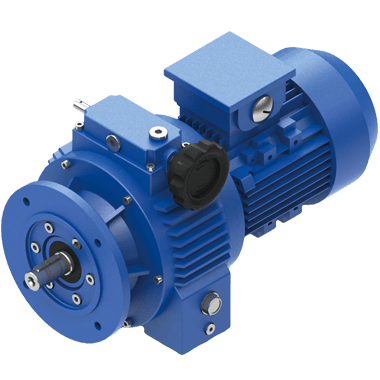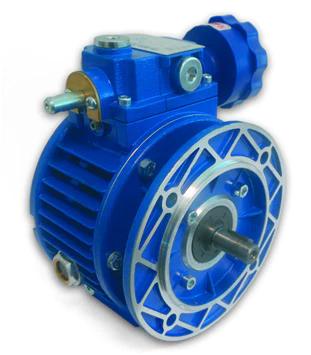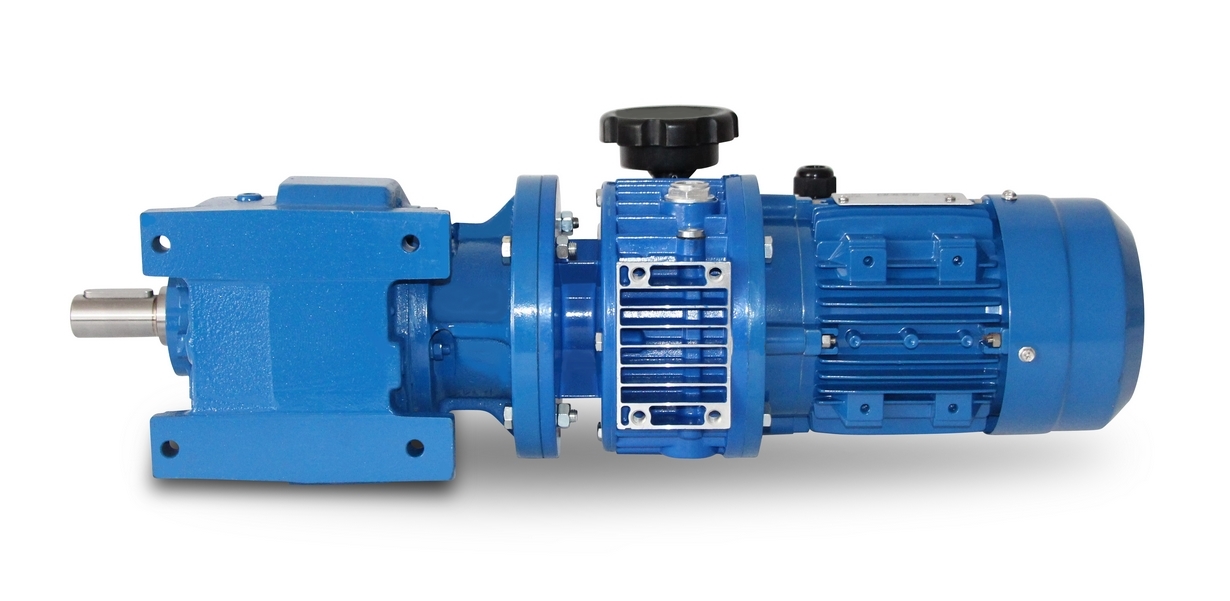Product Description
1) High precision of speed regulating for speed variator,UD gear box: up to 0.5-1 round
2) Large speed-changing range: the speed ratio ranges from 1:1.4 to 1:7 freely
3) High intensity and long serving time
4) Convenient to regulate speed
5) Continuously workable, bidirectional working direction,smooth running,
stable, and quiet
6) Fully sealed and suitable to any environment
7) Compact structure, small size
8) High quality aluminum alloy die-cast, elegant shape, light weight and non-rusting
9) Good adaptability: can be combined with all kinds of reducers to achieve low
stepless speed changing
10) Input power: 0.18-7.5kW
| Power | Model | I | n2(r/min) | M2(NM) |
| 0.18kw | UDL0.18 | 1.6-8.2 | 880-170 | 1.5~3 |
| 0.37kw | UDL0.37 | 1.4-7 | 1000-200 | 3~6 |
| 0.55kw | UDL0.55 | 1.4-7 | 1000-200 | 4~8 |
| 0.75kw | UDL0.75 | 1.4-7 | 1000-200 | 6~12 |
| 1.1kw | UD1.1 | 1.4-7 | 1000-200 | 9~18 |
| 1.5kw | UD1.5 | 1.4-7 | 1000-200 | 12~24 |
| 2.2kw | UD2.2 | 1.4-7 | 1000-200 | 18~36 |
| 3kw | UD3 | 1.4-7 | 1000-200 | 24~48 |
| 4kw | UD4 | 1.4-7 | 1000-200 | 32-64 |
| Output Speed: | 1000-200r/M |
|---|---|
| Input Speed: | 1400rpm |
| Power: | 1.1kw-7.5kw |
| Customization: |
Available
|
|
|---|
.shipping-cost-tm .tm-status-off{background: none;padding:0;color: #1470cc}
| Shipping Cost:
Estimated freight per unit. |
about shipping cost and estimated delivery time. |
|---|
| Payment Method: |
|
|---|---|
|
Initial Payment Full Payment |
| Currency: | US$ |
|---|
| Return&refunds: | You can apply for a refund up to 30 days after receipt of the products. |
|---|

What safety considerations are associated with the installation and operation of variator motors?
When installing and operating variator motors, several safety considerations should be taken into account. Here’s a detailed explanation:
Variator motors, like any other electrical or mechanical equipment, require proper installation, operation, and maintenance to ensure safe and reliable performance. Here are some key safety considerations associated with the installation and operation of variator motors:
- Electrical Safety: Variator motors are powered by electricity, so it’s crucial to follow electrical safety guidelines during installation and operation. This includes ensuring proper grounding of the motor and adhering to local electrical codes and regulations. It’s important to have a qualified electrician handle the electrical connections and ensure that the motor is properly wired and protected from electrical hazards.
- Mechanical Safety: Variator motors often have moving parts and may be connected to mechanical systems. During installation, it’s necessary to ensure that the motor is securely mounted and aligned with the driven equipment. Adequate guarding should be provided to prevent accidental contact with moving parts, such as belts, pulleys, or couplings. Properly sized and rated couplings, belts, and other mechanical components should be used to ensure safe and reliable operation.
- Overload Protection: Variator motors should be protected against overloading. Overloading can cause overheating, reduced motor life, and potential safety hazards. It’s important to select a motor with the appropriate power rating for the application and ensure that it’s not subjected to excessive loads. Additional overload protection devices, such as thermal protectors or overload relays, may be necessary to safeguard the motor and prevent damage or hazards.
- Heat Dissipation: Variator motors can generate heat during operation, especially at higher speeds or under heavy loads. Sufficient ventilation and cooling should be provided to dissipate the heat effectively. Adequate clearance around the motor and proper ventilation in the motor enclosure or installation area can help prevent overheating and ensure safe operation. It’s important to follow the manufacturer’s recommendations regarding cooling and ventilation requirements.
- Environmental Considerations: The installation and operation of variator motors should consider the environmental conditions in which they will be used. For example, if the motor will be exposed to moisture, dust, or corrosive substances, appropriate measures should be taken to protect the motor against these elements. This may include using sealed motor enclosures or installing the motor in a suitable protective housing. Additionally, if the motor will be used in hazardous locations, such as areas with flammable gases or dust, it must comply with the applicable safety standards and requirements.
- Proper Maintenance: Regular maintenance is essential for the safe and reliable operation of variator motors. This includes periodic inspection, cleaning, and lubrication of the motor and its components. It’s important to follow the manufacturer’s maintenance guidelines and schedule to ensure that the motor remains in good working condition. Any signs of wear, damage, or abnormal operating conditions should be addressed promptly to prevent safety risks.
- Training and Awareness: Proper training and awareness of the operators and maintenance personnel are crucial for safe operation and maintenance of variator motors. Operators should be knowledgeable about the motor’s operation, control features, and emergency procedures. Maintenance personnel should be trained to perform maintenance tasks safely and be aware of potential hazards associated with the motor. Regular safety training and refresher courses can help promote a safe working environment.
It’s important to note that the specific safety considerations may vary depending on the motor model, application, and local regulations. Therefore, it’s recommended to consult the manufacturer’s documentation and guidelines, as well as relevant safety standards, to ensure that all necessary safety precautions are followed during the installation and operation of variator motors.

How do variator motors contribute to energy efficiency in manufacturing processes?
Variator motors play a significant role in improving energy efficiency in manufacturing processes. Here’s a detailed explanation:
Variator motors, also known as variable speed motors or adjustable speed drives, offer the ability to adjust the motor’s speed and torque according to the requirements of the manufacturing process. This flexibility provides several ways in which variator motors contribute to energy efficiency:
- Optimized Process Control: By varying the motor’s speed, variator motors allow manufacturers to precisely match the motor’s output to the process requirements. This optimization eliminates the need for constant full-speed operation, which can result in unnecessary energy consumption. Instead, the motor can run at reduced speeds during periods of lower demand, resulting in energy savings.
- Reduced Mechanical Losses: Traditional motors operating at fixed speeds often use mechanical devices, such as throttling valves or dampers, to control the process flow or pressure. These devices introduce additional mechanical losses that consume energy. With variator motors, the motor speed can be adjusted directly, eliminating the need for such mechanical control devices and reducing energy losses associated with them.
- Efficient Motor Operation: Variator motors are designed to operate efficiently over a broad range of speeds. Unlike fixed-speed motors that may experience reduced efficiency at lower speeds, variator motors can maintain high efficiency even at reduced speeds. This efficiency is achieved through advanced motor designs, improved motor control algorithms, and the use of technologies like permanent magnet motors or synchronous reluctance motors.
- Power Factor Correction: Variator motors can incorporate power factor correction (PFC) techniques to improve the power factor of the motor. Power factor is a measure of how effectively the motor utilizes the supplied electrical power. By improving the power factor, variator motors reduce the reactive power drawn from the power grid, resulting in lower electricity bills and reduced strain on the electrical distribution system.
- Energy Recovery: Some variator motors can feature regenerative capabilities, allowing them to recover and feed excess energy back into the power grid or reuse it within the manufacturing process. For example, in applications where the motor decelerates or operates as a generator, the energy generated can be fed back into the grid or used to power other equipment, further enhancing energy efficiency.
- Process Optimization: Variator motors offer the advantage of precise control over motor speed and torque. This control can be utilized to optimize manufacturing processes, such as matching the motor speed to the optimal speed for material handling, mixing, or other process requirements. By fine-tuning the motor operation, variator motors enable improved process efficiency, reduced material waste, and energy savings.
By leveraging the flexibility and control offered by variator motors, manufacturers can achieve substantial energy savings in their production processes. The specific energy-saving potential will depend on the application, process requirements, and the extent to which the motor’s speed and torque can be optimized. It’s important to consult with motor manufacturers, engineers, and energy experts to assess the suitability and potential energy savings of variator motors in specific manufacturing applications.

What are the advantages of using variator motors in industrial settings?
Variator motors offer several advantages when used in industrial settings. Here are some key benefits:
- Flexible Speed Control: One of the primary advantages of variator motors is their ability to provide flexible speed control. Unlike traditional motors that operate at a fixed speed, variator motors allow for adjustable speed settings. This flexibility enables industrial processes to be optimized for different operational requirements, such as varying loads, different stages of production, or specific process demands.
- Energy Efficiency: Variator motors can help improve energy efficiency in industrial settings. By adjusting the motor speed to match the required output, these motors can avoid the energy losses associated with running at fixed speeds. Operating the motor at lower speeds when the full speed is not necessary can lead to significant energy savings. This energy efficiency not only reduces operational costs but also contributes to sustainability and environmental conservation efforts.
- Precise Process Control: The ability to finely tune the speed of variator motors enables precise process control in industrial settings. Processes that require accurate manipulation of speed, such as mixing, blending, and conveyance, can benefit from variator motors. The adjustable speed allows for better control over product quality, consistency, and production rates.
- Adaptability to Changing Loads: Variator motors are well-suited for applications that experience varying loads. The adjustable speed control allows the motor to respond to changes in load conditions, compensating for fluctuations and ensuring optimal performance. This adaptability is particularly advantageous in industries where load variations are common, such as material handling, conveyor systems, and production lines with varying throughput requirements.
- Reduced Mechanical Stress: In some industrial processes, sudden starts or stops and rapid speed changes can subject mechanical components to excessive stress, leading to premature wear and tear. Variator motors can mitigate this issue by providing smooth and controlled acceleration and deceleration. The ability to gradually ramp up or down the motor speed reduces mechanical stress on the system, prolonging the lifespan of equipment and minimizing maintenance needs.
- Improved Productivity: Variator motors can contribute to improved productivity in industrial settings. The adjustable speed control allows for process optimization, reducing cycle times and enhancing overall efficiency. By matching the motor speed to the specific requirements of each stage of production, variator motors can help streamline operations and increase productivity.
These advantages make variator motors a valuable choice for a wide range of industrial applications. Their flexibility, energy efficiency, precise control, adaptability, and productivity enhancements contribute to improved performance and cost-effectiveness in industrial settings.


editor by CX 2023-12-01